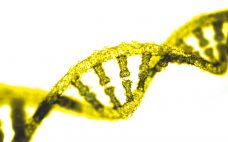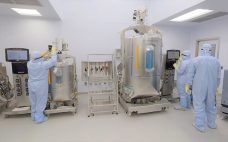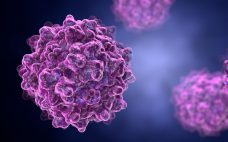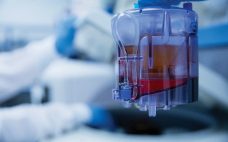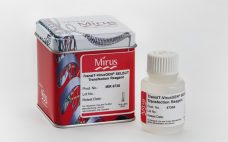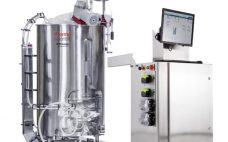This webcast features: Aleš Ĺ trancar, Managing Director, BIA Separations, a Sartorius Company In vitro transcription (IVT), the enzymatic process used for the production of mRNA vaccines, differentiates itself from biological fermentation processes by the need for linearized plasmid DNA. The linear isoform is produced with restriction enzymes from open-circular and supercoiled plasmid DNA. Employing a traditional pDNA manufacturing process, which removes linear and open-circular isoforms, will reduce production yield. However, when plasmid DNA and mRNA are treated as a single…
Manufacturing
AAV Suspension Platform Generations: Continuous Improvement Leading to Increased Viral Vector Titer and Yield
This webcast features: Yiyu Dong, Head of Cell Line Development, and David Barnard, Senior Scientist, Process and Technology Development, WuXi Advanced Therapies The field of gene therapy has experienced significant growth in recent years. Adenoassociated virus (AAV)–mediated therapies account for ~70% of the gene therapy market. However, the manufacturing capacity for AAV vectors remains a critical bottleneck. WuXi Advanced Therapies launched a world-class AAV suspension platform early 2020. In this webinar, we will reveal the improvements that increased viral vector…
Exploring New and Improved Analytical Methods for Traditional and Unique Modalities
This webcast features: Jason Sterling, Principal Scientist and Project Director, Analytical and Formulation Resources, and John Rockwell, Group Leader, Catalent Pharma Solutions Biophysical characterization is critical to understand the make-up and behaviors of biologic therapies and vaccines both early in development and throughout the manufacturing scale-up process. As biologics become more complex in structure, and as scientists improve their understanding of the effects of structure on stability, efficacy, safety, etc., there is a need to develop new and improved analytical…
Analytical Ultracentrifugation for Characterization of AAV Gene Delivery Vectors
This webcast features: Christopher Sucato, PhD, Associate Director, Biophysical Characterization, and Cynthia Swanson, Associate Research Scientist, Charles River Laboratories Analytical ultracentrifugation (AUC) has been a staple in the biopharmaceutical industry to analyze aggregation and higher-order structure in protein drug products. With the recent boom in cell and gene therapies using gene-delivery vectors, new avenues for AUC-based characterization and QC lot release methodologies are now available. View this webinar for a discussion on the new parameters of AUC analysis and how…
Opto-Sensor Guided Centrifugation for Efficient, Reagent-Free Cell Separation in a Semi-Automated Closed System
This webcast features: Ben Josey, PhD, Field Applications Scientist, Corning Life Sciences The potential for cell-based immunotherapies is moving fast. But some of the processes to develop and manufacture these clinical-grade therapies can slow you down. This Ask the Expert webinar will cover ways you can reduce the manual steps involved in traditional cell processing. Attend to learn more about: Tips to streamline cell separation and formulation of specific cell populations for cell and gene therapy development and manufacturing Ways…
Accelerate Cell and Gene Therapy Development and Increase Manufacturing Capacity with Higher Titer LV and AAV Transfection Platforms
This webcast features: Leisha Kopp, Applications Scientist, Mirus Bio Cell and gene therapies show unparalleled promise to improve the human condition by eradicating cancer and rectifying genetic disorders. However, low viral titers and capacity constraints in viral vector manufacturing processes can dramatically hinder the progress of these transformative therapies. The TransIT-VirusGEN® Transfection Reagent from Mirus Bio offers a simplified, cost-effective workflow for recombinant lentivirus (LV) and adenoassociated virus (AAV) generation. TransIT-VirusGEN Transfection Reagent is also effective in both adherent and suspension HEK 293–derived…
Strategic Development of Characterization and Quality Control Programs for Therapeutic Peptides
This webcast features: Ashleigh Wake, UK Business Development Director, Intertek Pharmaceutical Services Peptide therapeutics are a unique class of pharmaceuticals that may be regarded, in regulatory terms, as either conventional chemical molecules, biological entities or biosimilars. Slight changes in the structure, physicochemical properties, stability, and impurity profile of a peptide can provoke an adverse immune response; therefore, safety assessment is critical. Building a well-thought-out quality control (QC) strategy is key to meeting development milestones and complying with evolving regulatory requirements.…
Application-Specific Enhancements to Thermo Fisher Scientific™ HyPerforma™ Single-Use Bioreactors
This webcast features: Ben Madsen, Engineer, Thermo Fisher Scientific The rapid growth of biotherapeutic manufacturing has created significant demand for workflow solutions featuring greater product yield, lower production costs, and accelerated development timelines. To address these demands, developers have moved away from “one-size-fits-all” approaches and are increasingly focused on solutions that address the specific needs of diverse bioproduction processes. Given this shift toward process-specific solutions, Thermo Fisher Scientific™ has introduced a series of application-specific enhancements to the HyPerforma™ Single Use…
Cell Culture Media Manufacturing, Outsourcing and the Pandemic: An Essential Toolkit
This webcast features: Chad Schwartz, Senior Global Product Manager for Proprietary Cell Culture Media Formulations, and Eric Nalbach, Director of Product Management, Bioproduction, Cell Culture Media, Thermo Fisher Scientific The COVID-19 pandemic has had an unprecedented impact across the bioproduction industry, from supply chains to working practices. As organizations adapt to such changes, they have already experienced huge shifts in how the industry works. Those working in both research and manufacturing feel an obligation to employ all available resources to…
Enabling Large-Scale Production of Viral Vectors in the Gibco™ CTS LV-MAX Lentiviral Production System
This webcast features: Jonathan Zmuda, PhD, Director, Cell Biology, Life Science Solutions Group, Thermo Fisher Scientific The Gibco™ Cell Therapy Systems (CTS™) LV-MAX™ Lentiviral Production System enables scalable, high-titer production of lentiviral vectors using HEK293F-derived Gibco™ CTS™ Viral Production Cells adapted for high-density suspension growth in chemically defined, serum-free, and protein-free Gibco™ CTS™ LV-MAX™ Production Medium. Enhanced lentiviral production is enabled through the synergistic interplay of the LV-MAX components (including cells, production medium, supplement, enhancer, and transfection reagent), all of…

